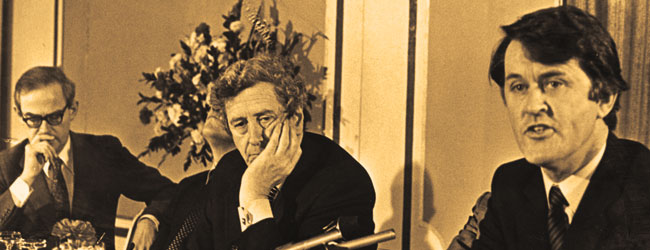5 January 2012
Same old story 30 years on
1981 STATE PAPERS RELEASED | LAVISH GOVERNMENT SPENDING IN DUBLIN AND STREET RIOTS IN BRITAIN
BY ROBBIE SMYTH
FINE GAEL and Labour form a coalition government, the Tories are in power in London, and a summer of riots sparks off across Britain while spending cuts and stealth taxes are introduced in Ireland. Dublin’s 1981 state papers show remarkable similarities between Ireland and Britain then and the political situation today.
Two Taoisigh
Charles Haughey’s last months in office bore all the hallmarks of his political career. There were unpaid bills for a case of red wine, priced at £90 a bottle in a period when the average industrial weekly wage was just £112.
Speaking with West German Chancellor Helmut Schmidt, Haughey showed his ability to formulate government policies ad hoc, telling Schmidt: “Ideologically and politically, Ireland is not neutral.”
Haughey’s one redeeming act of 1981 was his opposition to the Irish rugby team tour of apartheid South Africa.
The bizarreness of his tenure as Taoiseach is shown by plans made to justify a trip to Saddam Hussein’s Iraq while at the same time he wouldn’t travel to the US unless he would have a face-to-face meeting with new President Ronald Reagan. Haughey refused to attend the inauguration because he didn’t “want to be in any queue” to meet Reagan.
Michael O’Kennedy, a Haughey minister, was just one day short of five years’ ministerial service, which would have increased his pension. Haughey approved a solution to count the leap year day in 1980 as a means to give O’Kennedy a pension bonus of £500 a year. Kennedy was also receiving a salary as an EU Commissioner when “retired” as a politician.
Entertainment expenses were also a feature of Haughey’s successors in the FitzGerald Government. He charged the taxpayer £30.60 for having lunch with then SDLP leader John Hume in his luxury Dublin 6 red-brick home. FitzGerald’s Press Secretary, Liam Hourican, was also racking up bills for meals in some of Dublin’s best-known restaurants.
Facing into a massive international economic crisis, the issues that the Government devoted time to in 1981 make for fascinating reading. The Irish Secret Service formulated a World War III contingency plan, estimating that there were “over 500,000” people who were “fit for military service”. The report identifies sites for missiles and proposed a military pact with Britain.
The same Secret Service was worried about the Soviet Union seizing Rockall island for a Cold War spy base. The Government refused an EU proposal to have a common summer time for the emerging EU.
Thatcher’s Britain
The response of British Prime Minister Margaret Thatcher and her Cabinet to riots in Britain’s inner cities is a telling indictment not just of Thatcher’s ‘no such thing as society’ vision but also of David Cameron’s ‘Big Society’ ideology of 2011.
The Scarman Inquiry into the 1981 riots reported that street protests and violence in Brixton were “not pre-planned but the spontaneous welling-up of the feelings of angry young men”.
So, with no Facebook, Twitter, Blackberrys or a smartphone in sight, who would politicians blame for riots spreading? In 1981, it was the TV news bulletins that the British Cabinet blamed. Home Secretary William Whitelaw was told to remind TV stations that they must “pay greater attention to the possible effects of the way in which they collected and broadcast news items”.
The role of the police in 1981 was just as pertinent as in 2011, with Lord Scarman reporting that young people in the inner cities saw London’s Metropolitan Police as a “hostile police force”. Even Conservative Minister Michael Heseltine concluded after two weeks in Liverpool that there was “a serious breakdown in confidence” between the public and the police.
Also revealed are discussions on ‘abandoning’ Liverpool in the aftermath of the 1981 riots. Thatcher’s advisers wrote of the “concentration of hopelessness”. Geoffrey Howe, Chancellor of the Exchequer, was against investing in Liverpool, writing: “Isn’t this pumping water uphill? Should we go rather for ‘managed decline’?”
One-woman government
A key element of the British state papers is the absence of collective decision making. At one meeting, in July 1981, a majority of the Cabinet believed Government economic policies were not “a sufficiently imaginative or practicable response to acute social and political problems now confronting the Government”. But Thatcher went ahead anyway.
Later in 1981, a majority in Cabinet opposed updating the British Royal Navy’s nuclear missile programme. This did not deter Thatcher, who only acknowledged her secret decision to buy the Trident missiles when the New York Times was about to reveal the £10billion weapons spend.
Updating Trident has mired the current British Cabinet in disagreements. So will David Cameron adopt another tactic from the Thatcher playbook and unilaterally announce a Trident replacement?
Follow us on Facebook
An Phoblacht on Twitter
Uncomfortable Conversations

An initiative for dialogue
for reconciliation
— — — — — — —
Contributions from key figures in the churches, academia and wider civic society as well as senior republican figures





